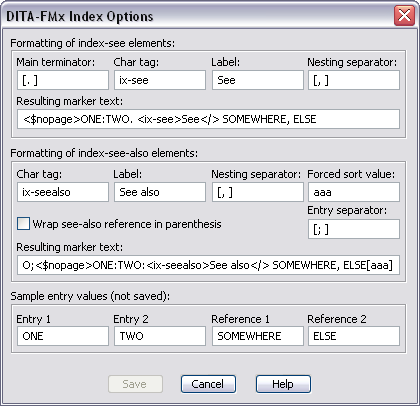Allows customization of the import/export processing of the marker syntax with index-see and index-see-also elements.
Although there are standards for the formatting of “see” and “see-also” index entries, each organization may want these entries to be constructed slightly differently. The Index Options dialog allows for this personalization. DITA provides the index-see and index-see-also elements for identifying these type of index entries, but in FrameMaker, the index syntax is all contained within a single Index marker (in DITA-FMx this becomes an fm-indexterm element). This dialog defines how the DITA elements map to and are converted from DITA into FrameMaker (and back).

The Index Options dialog provides two main sections, one for each of the “see” and “see-also” entry types. Within each section are fields (described below) and a “Resulting Marker Text” area that dynamically shows the index marker syntax to be generated using the fields as entered. The textual content used for the sample entries can be modified in the Sample Entry Values field. Any time a value requires leading or trailing spaces, wrap it in square or curly brackets ( “[ .. ]” or “{ .. }” ).
- index-see Options
- Main Terminator
- Separates the text of the main entry with that of the referenced entry. Typically a period followed by a space.
- Char Tag
- The name of the character style used to format the “see” reference entry. This is required even if there is no additional formatting to be applied because it is the only way for FrameMaker to know if the index entry is a “see” entry. The character tag “ix-see” is defined in the default DITA-FMx templates; you are free to modify the formatting of that tag. If you want to use a different character tag, you must add that style to the template.
- Label
- The label that separates the main entry and the referenced entry text. This value will be formatted with the character style specified in the Char Tag field.
- Nesting Separator
- Separates multiple referenced entries. Typically a comma with a trailing space.
- index-see-also Options
- Char Tag
- The name of the character style used to format the “see-also” reference entry. This is required even if there is no additional formatting to be applied because it is the only way for FrameMaker to know if the index entry is a “see-also” entry. The character tag “ix-seealso” is defined in the default DITA-FMx templates; you are free to modify the formatting of that tag. If you want to use a different character tag, you must add that style to the template.
- Label
- The label that separates the main entry and the referenced entry text. This value will be formatted with the character style specified in the Char Tag field.
- Nesting Separator
- Separates multiple referenced entries. Typically a comma with a trailing space.
- Forced Sort Value
- If you want the entry to sort in a particular manner, enter the forced sort text here.
- Entry Separator
- String that separates multiple top-level target entries. Typically a semicolon with a trailing space. This value is not represented in the sample Resulting Marker Text field.
- Wrap See-Also Reference
- If enabled, wraps the entire see-also reference in parenthesis.